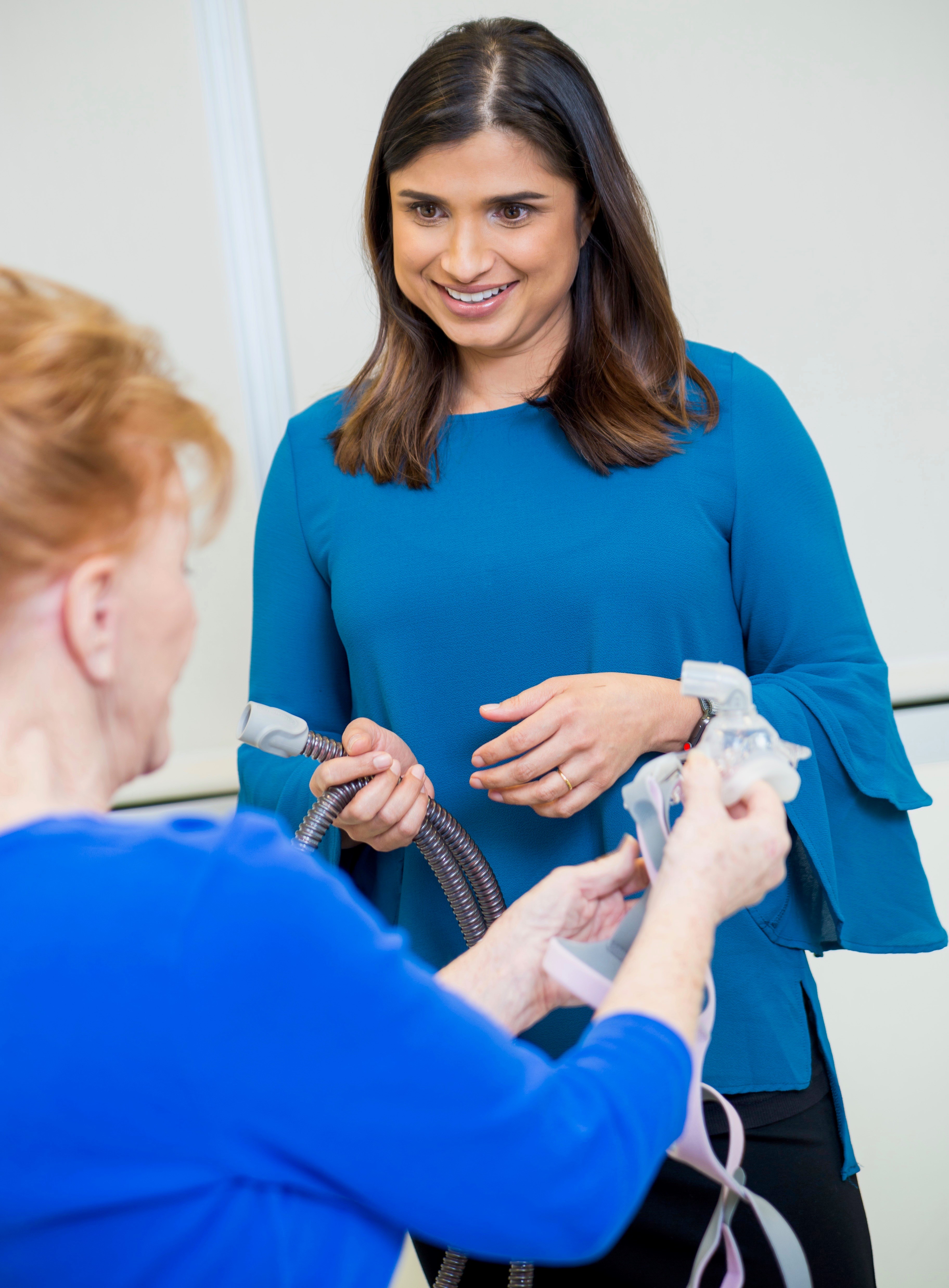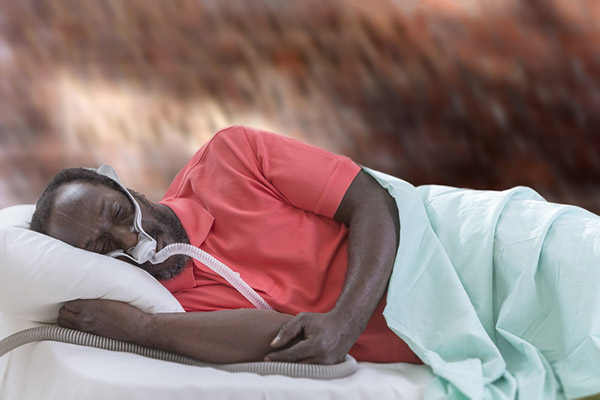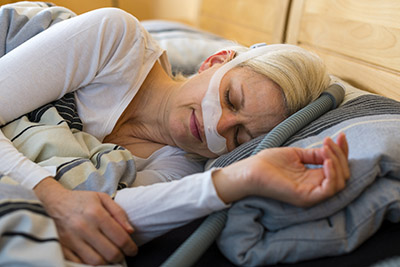Sleep Disorders Tests and Treatments

OHSU’s sleep experts can find the complex causes of your sleeplessness. We can provide the tools you need to improve your nighttime breathing or to solve other issues.
Our care includes:
- Expert providers with advanced training in sleep medicine.
- A full range of tests to pinpoint or rule out sleep disorders.
- Help managing home equipment to treat sleep apnea.
- Advanced sleep tests in homelike settings in Portland and Hillsboro.
- Specialists who meet weekly to discuss patient care.
When to seek treatment
Everyone has trouble sleeping at times. Sleep problems can be linked to stress, a physical ailment, diet or other issues. Talk to your doctor about a referral to the OHSU Sleep Medicine Program if:
- Your sleep does not improve with good sleeping habits, such as increasing exercise or reducing caffeine.
- Your partner notices an irregular breathing pattern, loud snoring, snorting or gasping while you’re asleep.
- You fall asleep during conversations or regular activities.
- You feel tired or unrefreshed much of the time.
- You can’t sleep through the night.
- You think an underlying physical or mental health condition is keeping you awake.
- You think your medication is disrupting your sleep.
Prepare for your sleep apnea appointment
Medical Animation Copyright © 2020 Nucleus Medical Media. All rights reserved.
What to expect at OHSU
If you come to OHSU, your doctor most likely referred you to our sleep specialists. Or you may have visited a throat specialist who wants to learn more before recommending surgery or other treatments.
Here’s how your visits with our sleep experts might go:
- Our sleep specialists may use a questionnaire called the Epworth Sleepiness Scale to learn more about your sleep patterns.
- We may suggest that you do a sleep study at our sleep lab or at home. Some overnight studies are followed by daytime studies.
- Your care team will develop a treatment plan. It may include home-based therapy, medication, surgery or treatment for other conditions.
- If you need home medical equipment, our sleep experts will demonstrate how to use it. They will also coordinate with your equipment provider to monitor your progress.
- You may be referred to a surgeon who can repair breathing impairments. Our team also offers an implanted device, Inspire, that can monitor and adjust your nighttime breathing.
- You may be referred to a behavior specialist who can address underlying issues.
- Your doctor may prescribe melatonin or other medication for an underlying disorder, such as narcolepsy or a mental health condition.

Diagnosing sleep disorders
Our specialists are skilled at choosing the best tests based on your symptoms.
This is the standard overnight sleep study conducted in one of our sleep labs. It is used to diagnose sleep apnea and other sleep disorders.
This in-lab test is used to determine the right amount of continuous positive airway pressure (CPAP) if you have a sleep apnea diagnosis. It is sometimes done the same night as an in-lab sleep study, in what is called a split-night sleep study.
In this test, you will come to the sleep lab to pick up your equipment to wear in your home at night. It provides less detailed data than an in-lab test but can be a good first step to diagnose sleep apnea. Some insurance companies have rules on which study is done first.
This test for people with daytime sleepiness determines if you can stay awake in a relaxed atmosphere (a comfortable chair and dim light) for 40 minutes.
This is a daytime sleep study that tests for signs of narcolepsy and other sleep disorders. It follows an overnight PSG and consists of five nap periods throughout the day. You are given a 30-minute period to test how quickly you fall asleep again.
This test, used for obstructive sleep apnea and insomnia, measures the time of day and length of time that you sleep. The test typically lasts for one to two weeks using a light sensor worn like a watch.
Treatments for sleep apnea
If you are diagnosed with sleep apnea, your care team will most likely recommend medical devices to provide steady air pressure while you sleep.
Treatments include:

CPAP (continuous positive airway pressure): This is the most common treatment for obstructive sleep apnea. You wear a mask or nosepiece for sleep.
It has a hose attached to a machine that forces air into nose to stimulate normal breathing. In most cases, treatment continues for life.
APAP (auto-adjusting positive airway pressure): This therapy is like CPAP but can adjust airway pressure minute by minute. An APAP machine is sometimes used to determine the ideal pressure before switching to a less-expensive CPAP machine.
BiPAP or BPAP (bilevel positive airway pressure): A machine delivers a higher air pressure for inhalation and a lower pressure for exhalation. It is often used to treat central sleep apnea.
ASV (adaptive servo-ventilation): This medical device adjusts positive airway pressure more responsively than BiPAP/BPAP machines. It is used if you have obstructive or central sleep apnea, or a combination.
Surgery: If you have enlarged tonsils, an abnormal jaw structure or other clear physical causes of your sleep apnea, surgery may be recommended.
Other sleep apnea therapies
Sleep apnea can be worse when you sleep on your back. Using a device that keeps you from rolling onto your back can help. Examples include:
Treatments for other sleep disorders
- Cognitive therapy: You may discover that depression or excessive anxiety is keeping you awake. If so, you may be referred to cognitive therapy (a type of counseling) to treat it.
- Oral devices: We work with several area dentists who have training in sleep disorders. They offer tools, such as mandibular advancement devices (holding the jaw forward to open the airway), to treat mild to moderate sleep apnea.
- Relaxation techniques: Tools for insomnia may include massage therapy, yoga and mindfulness-based stress reduction.
- Medication: If your sleep issues are linked to shift work or jet lag, your doctor may recommend medication.
- Surgery: A type of surgery called uvulopalatopharyngoplasty (UPPP), in which the soft palate and tissues of the throat are tightened, may be recommended to treat snoring. Your doctor may recommend bariatric surgery for weight loss if your weight affects your sleep patterns.
Learn more
- CPAP (continuous positive airway pressure), National Heart, Lung, and Blood Institute
- Sleep Apnea Treatment Options, American Sleep Apnea Association
- Sleep Studies, National Sleep Foundation
- Treatment and Therapy, American Academy of Sleep Medicine
For patients
Call 503-494-6066 to:
- Request an appointment
- Seek a second opinion
- Ask questions
Call 503-418-1850 for a sleep study appointment in one of our sleep labs.
Refer a patient
- Refer your patient to OHSU.
- Call 503-494-4567 to seek provider-to-provider advice.
Locations
Clinics
Parking is free for patients and their visitors.
Hatfield Research Center
3250 S.W. Sam Jackson Park Road
Portland, OR 97239
Map and directions
OHSU Health Sleep Medicine Clinic, Tanasbourne
3000 N.W. Stucki Place, Suite 280
Hillsboro, Oregon 97124
Map and directions
Sleep labs
Marriott Hotel - Portland
2115 S. River Parkway
Portland, OR 97201
Map and directions
Sleep Medicine Lab - Tanasbourne
3000 N.W. Stucki Place, Suite 280
Hillsboro, OR 97124
Map and directions